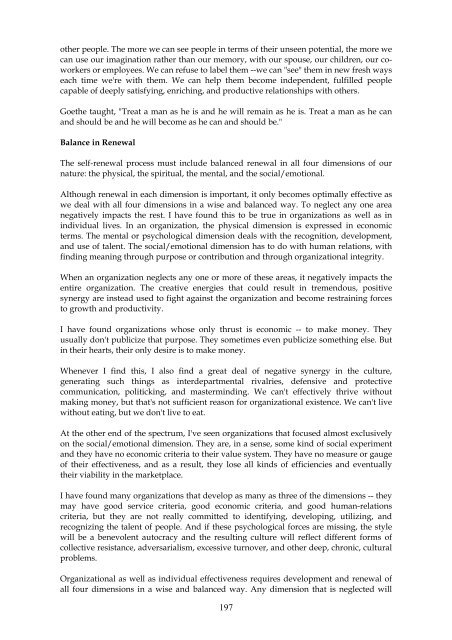Covey - The 7 habits of highly effective people
Create successful ePaper yourself
Turn your PDF publications into a flip-book with our unique Google optimized e-Paper software.
other <strong>people</strong>. <strong>The</strong> more we can see <strong>people</strong> in terms <strong>of</strong> their unseen potential, the more we<br />
can use our imagination rather than our memory, with our spouse, our children, our coworkers<br />
or employees. We can refuse to label them --we can "see" them in new fresh ways<br />
each time we're with them. We can help them become independent, fulfilled <strong>people</strong><br />
capable <strong>of</strong> deeply satisfying, enriching, and productive relationships with others.<br />
Goethe taught, "Treat a man as he is and he will remain as he is. Treat a man as he can<br />
and should be and he will become as he can and should be."<br />
Balance in Renewal<br />
<strong>The</strong> self-renewal process must include balanced renewal in all four dimensions <strong>of</strong> our<br />
nature: the physical, the spiritual, the mental, and the social/emotional.<br />
Although renewal in each dimension is important, it only becomes optimally <strong>effective</strong> as<br />
we deal with all four dimensions in a wise and balanced way. To neglect any one area<br />
negatively impacts the rest. I have found this to be true in organizations as well as in<br />
individual lives. In an organization, the physical dimension is expressed in economic<br />
terms. <strong>The</strong> mental or psychological dimension deals with the recognition, development,<br />
and use <strong>of</strong> talent. <strong>The</strong> social/emotional dimension has to do with human relations, with<br />
finding meaning through purpose or contribution and through organizational integrity.<br />
When an organization neglects any one or more <strong>of</strong> these areas, it negatively impacts the<br />
entire organization. <strong>The</strong> creative energies that could result in tremendous, positive<br />
synergy are instead used to fight against the organization and become restraining forces<br />
to growth and productivity.<br />
I have found organizations whose only thrust is economic -- to make money. <strong>The</strong>y<br />
usually don't publicize that purpose. <strong>The</strong>y sometimes even publicize something else. But<br />
in their hearts, their only desire is to make money.<br />
Whenever I find this, I also find a great deal <strong>of</strong> negative synergy in the culture,<br />
generating such things as interdepartmental rivalries, defensive and protective<br />
communication, politicking, and masterminding. We can't <strong>effective</strong>ly thrive without<br />
making money, but that's not sufficient reason for organizational existence. We can't live<br />
without eating, but we don't live to eat.<br />
At the other end <strong>of</strong> the spectrum, I've seen organizations that focused almost exclusively<br />
on the social/emotional dimension. <strong>The</strong>y are, in a sense, some kind <strong>of</strong> social experiment<br />
and they have no economic criteria to their value system. <strong>The</strong>y have no measure or gauge<br />
<strong>of</strong> their <strong>effective</strong>ness, and as a result, they lose all kinds <strong>of</strong> efficiencies and eventually<br />
their viability in the marketplace.<br />
I have found many organizations that develop as many as three <strong>of</strong> the dimensions -- they<br />
may have good service criteria, good economic criteria, and good human-relations<br />
criteria, but they are not really committed to identifying, developing, utilizing, and<br />
recognizing the talent <strong>of</strong> <strong>people</strong>. And if these psychological forces are missing, the style<br />
will be a benevolent autocracy and the resulting culture will reflect different forms <strong>of</strong><br />
collective resistance, adversarialism, excessive turnover, and other deep, chronic, cultural<br />
problems.<br />
Organizational as well as individual <strong>effective</strong>ness requires development and renewal <strong>of</strong><br />
all four dimensions in a wise and balanced way. Any dimension that is neglected will<br />
197


